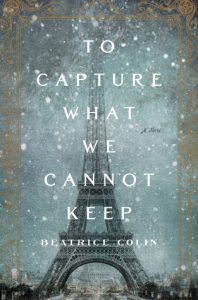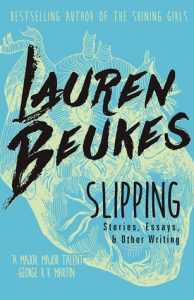
 Title: To Capture What We Cannot Keep by Beatrice Colin
Title: To Capture What We Cannot Keep by Beatrice Colin Published by Flatiron Books
Published: November 29th 2016
Genres: Fiction, Historical
Pages: 304
Format: eBook
Source: Netgalley
Goodreads
Set against the backdrop of Paris during la belle époque, Beatrice Colin’s To Capture What We Cannot Keep explores the intertwining lives of two Scottish siblings and their chaperone with Émile Nouguier and Gustave Eiffel during the construction of the Eiffel Tower. This novel is a perfect winter read. It’s a bit sad and melancholy, but it’s got a lot of heart and warmth throughout. Caitriona and Émile’s relationship develops against all odds due to their differences in social status. Émile is expected to marry well and into money, but he falls in love with a woman who is beneath his status and invisible in polite society. Caitriona is a widow who takes the job of chaperoning Alice Arrol and, effectively, Alice’s brother Jamie as they finish themselves in a Grand Tour. Caitriona and Émile meet briefly in a hot air balloon and cannot stop thinking about each other after Caitriona leaves Paris.
While Alice and Jamie seemed underdeveloped (and Jamie seemed to be referred to by his last name that led to some confusion for awhile), Caitriona and Émile captured me from the beginning, and I couldn’t wait to see where the story took them. Alice and Jamie return to Paris to partake in secret relationships of their own while Caitriona’s relationship develops with Émile.
The background details shone and helped illustrate the emotions and thoughts of the characters. It’s good to know about this era before reading it, or to know about the customs and secret languages of men and women during the mid- to late- 1800s, because there is so much telling in the details. In the last quarter of the book, Caitriona’s chaperoning took a different turn as she seemed to stop chaperoning entirely, even when not actively engaged with Émile. Without giving away spoilers, Jamie was left to do his own thing with little to know consequence, and even Alice’s stumble had a neat resolution that usually does not end up so well for women. I think we learn a little too late about Caitriona’s history with her husband, and some of the more disturbing details seemed to be another thing to take me out of the story for a moment to think about why those details were revealed so late in the novel.
All in all, this is a lovely novel that would read well with a cup of hot cocoa and a snowfall in the depth of winter. If you enjoy reading historical fiction about women in Paris with a little bit of romance sprinkled in, add this to your reading list.

 Title:
Title:  Title:
Title: